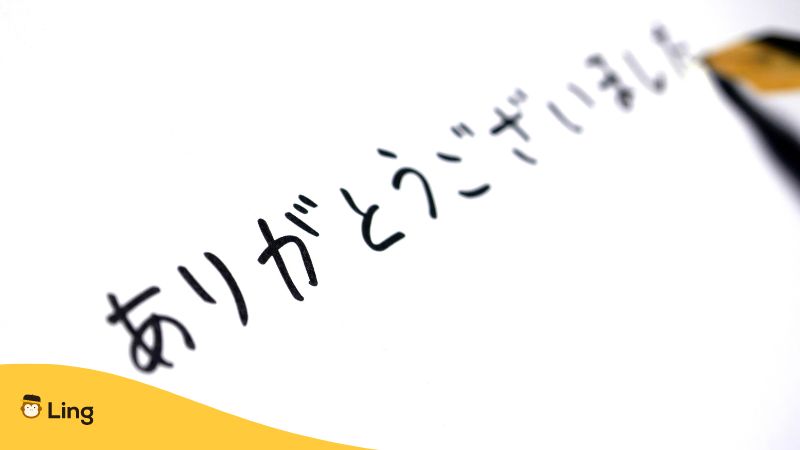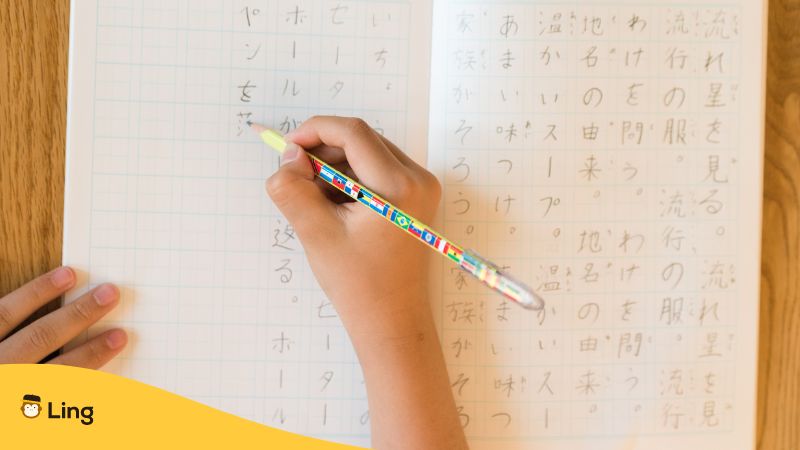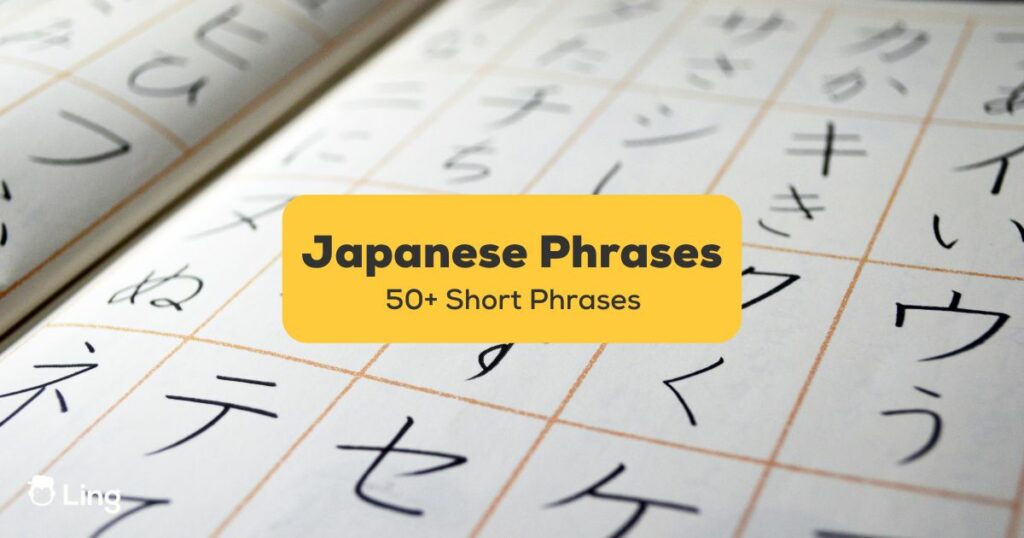The Japanese language is a really popular language to learn, but what if you want to jump right into speaking conversational Japanese? If so, you’ve come to the right place! I’ve compiled a list of essential short Japanese phrases that you can use in a simple Japanese conversation.
Start learning how to speak Japanese with these basic Japanese phrases. Once you start speaking Japanese, you’ll find yourself connecting to Japanese culture on a deeper level. Whether you’re visiting Japan soon or you recently started learning Japanese, this guide will help you increase your Japanese knowledge and enrich your language-learning journey.
So, what are you waiting for? Read on to find out more about basic phrases in the Japanese language. You’ll find yourself learning not just a Japanese phrase, but perhaps even new Japanese vocabulary.

Useful Short Japanese Phrases
Japanese Greetings
Greetings are the first step to making a good impression, making them must-learn Japanese phrases! Think about it, they’re the first thing you’d say to someone when you step into a convenience store or Konbini (コンビニ), a department store shop or Depato ten (デパート店), and more! Without further ado, here are some useful Japanese phrases for greetings.
| English Translation | Japanese Script | Romanization |
|---|---|---|
| Hello | こんにちは | Konnichiwa. |
| Good morning | おはようございます | Ohayō gozaimasu |
| Good evening | こんばんは | Konbanwa |
| Goodbye. | さようなら | Sayōnara |
| Thank you. | ありがとうございます | Arigatō gozaimasu |
| You’re welcome | どういたしまして | Dōitashimashite |
| Excuse me | すみません | Sumimasen |
| Long time no see | お久しぶりです | O hisashiburi desu |
| Nice to meet you | はじめまして | Hajimemashite |
| How are you? | お元気ですか? | O genki desu ka? |
Common Japanese Phrases
Now that you’ve learned a few basic Japanese phrases for greetings, it’s time to learn some common Japanese phrases! These are Japanese phrases you’d frequently use on a day-to-day basis. For example, if you want to order food, simply say the name of the food item, followed by “Onegaishimasu” (お願いします). If you’re walking on the street and you accidentally bump into someone, you’d want to know how to apologize with “Gomennasai” (ごめんなさい). So here are some common Japanese phrases you should know!
| English Translation | Japanese Script | Romanization |
|---|---|---|
| Please | お願いします | Onegaishimasu |
| Let’s eat | いただきます | Itadakimasu |
| Thank you for the meal | ごちそうさまでした | Gochisōsama deshita |
| Good job | お疲れ様です | Otsukaresama desu |
| I’m sorry | ごめんなさい | Gomennasai |
| I don’t understand | 分かりません | Wakarimasen |
| Go ahead | どうぞ | Dōzo |
| What’s wrong? | どうしたの? | Dō shita no? |
| Are you okay? | 大丈夫ですか? | Daijōbu desu ka? |
| Of course | もちろんです | Mochiron desu |
At The Hotel
After landing at the airport, you take either a taxi or the train to your hotel. Before you walk to the concierge to check in, it’ll be great if you know a few basic Japanese phrases for checking into your room. Even though hotels usually have staff who are English speakers, being able to use some Japanese phrases might just make your check-in process easier. Who knows, the staff may also be impressed because you’ve done some homework before visiting Japan!
| English Translation | Japanese Script | Romanization |
|---|---|---|
| I have a reservation | 予約しています | Yoyakushiteimasu |
| What time is check-in? | チェックインは何時ですか? | Chiyekkuin wa nan ji desu ka? |
| What time is check-out? | チェックアウトは何時ですか? | Chiyekku auto wa nan ji desu ka? |
| The room is clean | 部屋は綺麗です | Heya wa kirei desu |
| Is there internet connection? | インターネットはありますか? | Intanetto wa arimasu ka? |
| What time is breakfast? | 朝食は何時からですか? | Chōshoku wa nan ji kara desu ka? |
| I’d like to change rooms | 部屋を変えたいです | Heya o kaetai desu |
| Is there a bath? | お風呂はありますか? | O furo wa arimasu ka? |
| Are there amenities? | アメニティはありますか? | Amenithi wa arimasu ka? |
| I lost the key | 鍵をなくしました | Kagi o nakushimashita |
Food And Dining
It’s your first time or the first time in a while visiting Japan, and all that walking is making you hungry. What do you have to do? Find food, of course! Whether you’re craving sushi, sashimi, or tempura, you’ve got to know how to order and talk about food with basic Japanese phrases about food. And if you’re going for Teppanyaki (鉄板焼き), there’s a high chance that the chef will ask you how’s the food! That’s why you need to know basic Japanese phrases related to food, so you can give the chef a thumbs up and tell him how delicious, or Oishii (おいしい), his food is!
| English Translation | Japanese Script | Romanization |
|---|---|---|
| It’s delicious, isn’t it? | おいしいですね | Oishii desu ne |
| What is this? | これは何ですか? | Kore wa nani desu ka? |
| Is it spicy? | 辛いですか? | Karai desu ka? |
| Is it sweet? | 甘いですか? | Amai desu ka? |
| One more please | もう一つください | Mō hitotsu kudasai |
| Please show me the menu | メニューを見せてください | Menyu- o misete kudasai |
| Can I have some water | お水をください | O mizu o kudasai |
| Check please | お勘定お願いします | O kanjō onegaishimasu |
| Is this a drink? | これは飲み物ですか? | Kore wa nomimono desu ka? |
| Thanks for the meal | ごちそうさまでした | Gochisōsama deshita |
Travel and Sightseeing
Now that you’ve filled your stomach, it’s time for you to continue exploring. But since it’s your first time in Japan, or maybe it’s been a while since you last visited, you’re feeling a little lost. The complicated Tokyo Metro (東京メトロ) map isn’t making it any better either! If you ever find yourself in this situation, it’ll be good for you to know basic Japanese phrases related to asking for directions. Japanese people are really friendly in general, so they usually wouldn’t hesitate to help. Just be sure to know some handy Japanese phrases for a scenario like this.
| English Translation | Japanese Script | Romanization |
|---|---|---|
| Do you have a map? | 地図がありますか? | Chizu ga arimasu ka? |
| Where’s this place? | ここはどこですか? | Koko wa doko desu ka? |
| Where’s the train station? | 駅はどちらですか? | Eki wa dochira desu ka? |
| Where does this bus go? | このバスはどこへ行きますか? | Kono basu wa doko e ikimasu ka? |
| What time does it depart? | 何時に出発ですか? | Nan ji ni shuppatsu desu ka? |
| Where can I buy tickets? | チケットはどこで買えますか? | Chiketto wa doko de kaemasu ka? |
| Are there any tourist attractions here? | 観光地はありますか? | Kankōchi wa arimasu ka? |
| Can I take pictures here? | ここで写真を撮ってもいいですか? | Koko de shashin o totte mo ii desu ka? |
| This is a map | これは地図です | Kore wa chizu desu |
| Where’s the restroom? | トイレはどこですか? | Toire wa doko desu ka? |
At The Pharmacy
After a long day, you can’t help but feel a bit worn out. Perhaps you’re visiting in winter, so you’re coughing or sneezing a little after being out the whole day. This is when you might consider dropping by the pharmacy to get some medicine. In this scenario, knowing Japanese phrases related to buying medicine would come in handy. Learning Japanese words related to symptoms you have, such as “お腹が痛い” (Onaka ga itai) for stomachache or “かぜ” (Kaze) for cold, would be helpful as well. So here are the most common Japanese phrases for just that.
| English Translation | Japanese Script | Romanization |
|---|---|---|
| Where’s the pharmacy? | 薬局はどこですか? | Yakkyoku wa doko desu ka? |
| I have a headache | 頭痛があります | Zutsū ga arimasu |
| How do I take this medicine? | 薬は飲み方を教えてください | Kusuri wa nomikata o oshiete kudasai |
| I have a sore throat | 喉が痛いです | Nodo ga itai desu |
| Can I get a prescription? | 薬を処方してもらえますか? | Kusuri o shohōshitemoraemasu ka? |
| I have a stomachache | お腹が痛いです | Onaka ga itai desu |
| I have a cold | かぜをひいています | Kaze o hiiteimasu |
| I have a wound | 傷があります | Kizu ga arimasu |
| Which one’s the medicine? | 薬はどれですか? | Kusuri wa dore desu ka? |
| My eyes are itchy | 目がかゆいです | Me ga kayui desu |

Ready To Learn Japanese?
Subarashii (素晴らしいい)! You’ve learned lots of useful phrases in Japanese today. Of course, learning doesn’t stop there, as there’s much more to the Japanese language than just a few phrases. So if you want to speak Japanese more proficiently, you should go beyond learning just the most common phrases and connect with Japanese people on a deeper level.
You can start by learning formal Japanese before moving on to more casual Japanese that’s more frequently used on a day-to-day basis. Or you can practice with fellow Japanese speakers and apply what you’ve learned when you visit Japan. Everyone has different methods when it comes to studying Japanese, so just do what works best for you!
I personally recommend using the Ling app. One of the toughest things in the Japanese language is learning Kanji, especially if you have no prior experience with the Japanese writing system or Kanji characters. With the Ling App, you’ll have a fun and interactive way of learning Japanese words, and you’ll also definitely be learning Japanese vocabulary and grammar beyond what this article has covered. Gone will be the days of “Nihongo ga wakarimasen” (日本語が分かりません), so don’t give up on learning Japanese! Keep studying Japanese and ganbatte (頑張って)!


































































